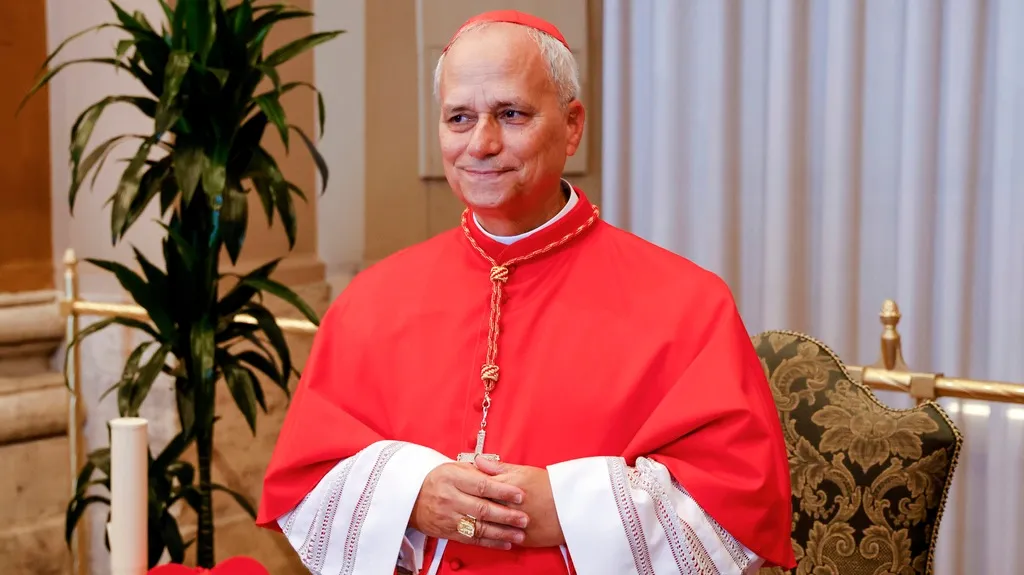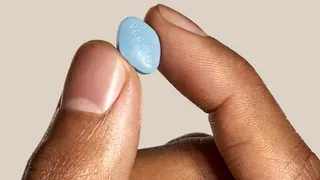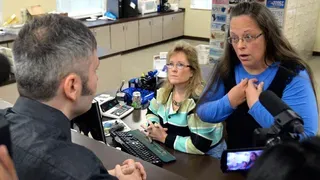December 20, 2010
Now What? Second Guessing Goes On After DADT Vote
Kilian Melloy READ TIME: 9 MIN.
Even some Marines who say that allowing gays in the military to be honest about who they are will not be disruptive wonder whether gays will crumble in the heat and stress of combat.
Others fear that sexual tension will prove damaging to unit morale and cohesion. And some even suggest that, should the draft ever be brought back, gays may come to regret the victory they achieved when the Senate approved legislation to repeal "Don't Ask, Don't Tell," the 17-year-old law that allows gays and lesbians to serve their country in uniform--as long as they are willing to lie about it.
Those concerns sound like stereotypes, but they indicate the starting point for a new era in which America's fighting forces will finally, fully become integrated. Though highly decorated gay veterans have told their stories to national audiences, only time--and the everyday presence of openly gay and lesbian soldiers--will eventually dispel the idea that gay warriors are not strong enough, or disciplined enough, to do the job as well as straights.
The New York Times reported on Dec. 19 about one common conception among heterosexual males in the military: that they will not be strong enough to stand up under pressure when the shooting starts. "They won't hold up well in combat," Marine Private Daniel Caras, 18, a native of New York, told the newspaper. Otherwise, Caras reckons that it only makes sense for the military to welcome openly gay patriots into the ranks.
Others, including the head of the Marine Corps, Gen. James Amos, fear that sexual undercurrents will erode morale among units in the field of battle. Amos stated publicly that he thought gay troops would prove to be a "distraction" for their straight comrades, given the close quarters in which active duty fighting men live and operate. He was far from alone in holding that view.
"Coming from a combat unit, I know that in Afghanistan we're packed in a sardine can," one young Marine, 22-year-old Cpl. Trevor Colbath, told the Times. "There's no doubt in my mind that openly gay Marines can serve, it's just different in a combat unit. Maybe they should just take the same route they take with females and stick them to noncombat units."
But others point out a simple fact: many gays and lesbians already serve, and many of them do so with valor and distinction. Simply stepping out of the closet won't undercut their performance as professional warriors; if anything, no longer having to guard the secret of their sexuality should free up reserves of mental energy that can be used to focus on the task at hand: defeating foes in battle and keeping America safe.
"The thought they would freak out, be unprepared or panic is completely belied by the facts that have come out during this debate," said Alexander Nicholson, a military veteran who heads up Servicemembers United, a support group for GLBT military personnel.
Another veteran, 25-year-old former Army Sgt. Anthony Wilfert, went through combat himself, without undue problems. His colleagues knew he was gay, but that did not destroy morale or discipline or make his unit unfit to fight. "No one feared that I would not be able to handle myself or be able to help other men and women on the battlefront," Wilfert told the Times. Instead, it was a different foe that brought him down: despite his service record and his promotion to sergeant, Wilfert was eventually booted from the Army because he was gay.
But while some opponents of repealing DADT have speculated that troops from more rural, conservative areas would view their openly gay brothers in arms with religiously motivated mistrust, at least one Southern Marine, 19-year-old Pfc. Alex Tuck, from Alabama, expressed no such qualms. Tuck said that one sticking point--who showers when, and with whom--would be "awkward," but added, "But as long as a guy can hold his own and protect my back, it won't matter if he is gay."
A colleague of Tuck, however, echoed a common perception about gays. "Being gay means you are kind of girly," said Justin Rea, who hails from Michigan. "The Marines are, you know, macho."
Those misapprehensions could lead to resentment and harassment of troops who are gay--or who are perceived to be gay. One officer told the Times anonymously that the shift to a fully integrated military could entail some friction within the ranks. "They were kicking people out for being homosexual, and now they will be kicking people out for picking on homosexuals," the officer predicted.
Another noted that openly gay troops would not feel the same need for protective coloration as their closeted counterparts. "They will not be going to all of the events, strip clubs and bars that the other soldiers attend, and [straight] soldiers will almost certainly not be going out of their way to sample the gay culture," the second officer said. "The first gay men (as the infantry is all male) are going to need very thick skins."
But what it all came back to was the matter of whether a soldier can endure the rigors and privations of war--and whether a gay soldier can shoot straight. ""Honestly, what I care about is how good a gunner they are," still another officer commented anonymously. "If an individual is performing well on the battlefield, people won't care."
The fact of the matter, of course, is that gays--many, but not all, closeted--have held their own on the battlefield in all of America's wars. One major piece of gay history in this country is how gay men served in World War II alongside their heterosexual countrymen--until the fighting on two fronts was over and America emerged victorious. At that point, men who served in the military even though they were known to be gay were summarily ejected from the ranks--and their names often supplied to the local police. War heroes as long as the sound of the guns and grenades echoed, gay fighting men were suddenly reduced to objects of distrust and surveillance once back home in peacetime.
More recently, gays have been similarly tolerated in the ranks of the America's all-volunteer fighting force. Writer and researcher Nathaniel Frank, in the book Unfriendly Fire: How the Gay Ban Undermines the Military and Weakens America, notes that whatever the laws and policies may say on paper, "when it comes to real life, the military has no trouble sending gays to war." Frank cites The Boston Globe as reporting that after the events of Sept. 11, 2001, the military allowed increasing numbers of gays to remain in the service once they had been identified. "The pattern raises serious questions about the elaborate rationale that the presence of open homosexuals would undermine unit cohesion," Frank wrote. "After all, if gays impair unit cohesion, and if cohesion is most critical during wartime, then the years following 9/11 would be the last time you would want to relax the ban."
Frank also notes in Unfriendly Fire that known gays served in World War II, but were then tossed out of the military once the war ended. At the start of the Korean War, however, the trend reversed once again--"discharges in the navy fell by half," Frank notes. With the conclusion of the Korean War, gays were once more subject to discharge, but such decreases slowed as America entered the Vietnam War. The pattern repeated itself during the first Gulf War, noted Frank, who then went on to report that as America prepared for the current conflict in Iraq, "commanders were being instructed to mobilize know gays" for service in the Middle East."
Fast Track to Equality?
Opponents of DADT's repeal have worried aloud that acceptance of openly gay troops could hasten legal parity and social acceptance for gay civilians and their families--and pro-equality advocates have given voice to the same thought. Whereas anti-gay groups speak of such an outcome as a dire consequence, pro-equality forces compare current developments with historical trends and note that racial integration was a major step toward legal and social parity for African-Americans.
Indeed, even before President Obama has signed the bill into law, Media Matters--a pro-equality organization--has established a offshoot, Equality Matters, which its creators, Clinton advisor Richard Socarides and former conservative journalist David Brock, described to the media as a "war room for gay equality," reported the New York Times in a separate Dec. 19 article.
The repeal legislation will not come into effect at once. DADT will remain in force until such time as the Commander in Chief, the Secretary of Defense, and the Chairman of the Joint Chiefs of Staff all sign a letter to certify that the time is right, Fox News reported on Dec. 20.
The Fox news article offered a rundown of several issues related to the repeal, including questions of housing and recognition of same-sex troops' families. With exceptions possible on a case-by-case basis, the article noted, gay troops would not be housed separately from heterosexuals. As for married gay and lesbian troops, the fact that an anti-gay 1996 federal law, the "Defense of Marriage" Act, is still in force means that same-sex marriages, even when granted in the handful of states where marriage parity is legal, do not carry federal-level recognition. That means that married gay troops would be regarded as single no matter where they were from, or where they were stationed.
On the wider political and social canvas, a Dec. 19 article posted at the Atlantic Wire speculated that the successful passage of repeal legislation will restore the Obama administration's credibility with liberals. However, even when DADT is finally repealed and openly gay troops can serve without fear of being separated from the service, DOMA will continue to create a de factor "two tiered" system for America's patriots in uniform, the Atlantic article said, noting that gay married servicemembers would be "barred by the federal Defense of Marriage Act from receiving some of the benefits that opposite-sex partners or opposite-sex spouses would receive from the military."
Critics who gave voice to fears that recruitment and retention would suffer once gays were allowed to serve openly may well find that their predictions of a military gutted by an exodus of heterosexuals fail to materialize; as advocates of repeal point out, similar predictions were made in other nations that proceeded to set aside their own anti-gay bans, with no ill effect. Moreover, similar predictions attended racial and gender integration in the American military, but no decimation of the ranks took place. Indeed, the Atlantic Wire pointed out that one immediate advantage to the end of DADT is that colleges that have been reluctant to invite the ROTC and military recruiters because their own anti-discrimination policies put them at odds with the military will now open up their campuses because that conflict will no longer exist.
Others point out that a pool of able-bodied, competent troops have been awaiting their chance within the gay community itself, and will now jump at the chance to enlist--quite possibly boosting the military's numbers, and its overall quality as well. With two wars ongoing and the all-volunteer fighting forces being put through multiple rotations, recruiters had been forced to lower their standards, creating a situation in which the physically unfit and even the criminal were being accepted into the military, while otherwise qualified recruits were shut out due to their sexuality.
"Gays and lesbians in Northeastern Pennsylvania would have liked to enlist in military service," noted the NEPA Rainbow Alliance's John Dawe, Wilkes-Barre, Penn., based publication CitizensVoice.com reported on Dec. 20. "They didn't because being forced to lie is a contradiction to our military's core values of trust, integrity and openness. With the repeal of don't ask, don't tell, they can now do so."
Perhaps the most overlooked factor in the contentious debates over accepting openly gay patriots for military service has been the professionalism and commitment of heterosexual servicemembers. Even Marine Corps Commandant Gen. James Amos indicated that when DADT is finally retired, he himself would "personally lead this effort, thus ensuring the respect and dignity due all Marines," and saying that his branch of the service would "step out smartly to faithfully implement this new policy,"
the Associated Press reported.
Some civilians and veterans persist in claiming that the transition will not go smoothly. "The acceptance of open homosexuality and the creation and enforcement of new policies could be far more difficult to implement than repeal advocates ever envisioned," Marine veteran Richard L. Eubank, who heads up Veterans of Foreign Wars, told the press. Eubank went on to level a charge to which critics of gays have often resorted, whether lambasting them for wanting to marry, for not wanting to marry, for wanting to parent children, or for refraining from becoming parents: in pursuing the right to serve their country, Eubank suggested, gays and their supporters were being selfish.
"Repeal advocates are focused primarily on pushing a social agenda about individual rights," Eubank stated, according to Dec. 20 article in the New York Daily News. "National security, unit cohesion and morale are the furthest things from their minds."
Meanwhile, Elaine Donnelly, an outspoken critic of repeal and the head of the Center for Military Readiness, said that the repeal process was a "sham" being perpetrated by leaders who had decided on the outcome in advance.
Bloggers and commentators had their say, as well. "When the cheering and celebration dies down, it may finally occur to many gay men that all of a sudden not being able to get out of a draft based on your sexuality, might not be such a good thing," wrote one individual at the online comments section hosted by the Florida Times-Union.
"Personally, I think kicking someone out of the military based on their sexuality and not on their performance was not the smartest thing our military could do," the commentator added, going on to write, "I also think that females need to be included in any registration and draft, you can't claim equal rights while hiding behind a skirt to duck responsibilities."
Kilian Melloy serves as EDGE Media Network's Associate Arts Editor and Staff Contributor. His professional memberships include the National Lesbian & Gay Journalists Association, the Boston Online Film Critics Association, The Gay and Lesbian Entertainment Critics Association, and the Boston Theater Critics Association's Elliot Norton Awards Committee.







